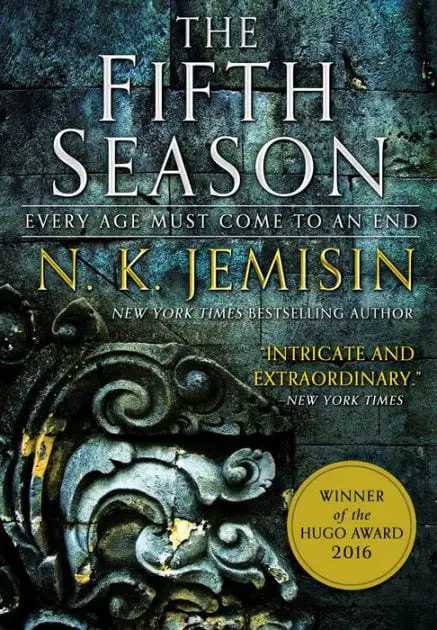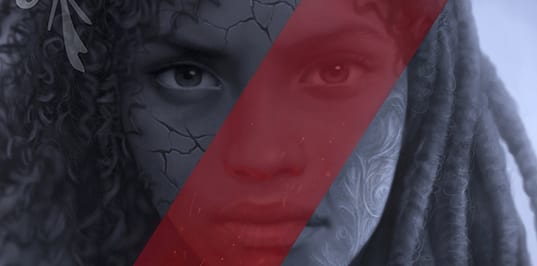Greetings, dear readers. After a long break, I return to you, bearing opinions about my latest attempt to broaden my reading horizons. This time it’s The Fifth Season, the first book of the Broken Earth trilogy by N. K. Jemisin. I bought and read the book without much of an idea what to expect. I was enthralled by Jemisin’s style and impressed by her world-building but sadly disappointed by some of her choices of topic matter.
I will mention some elements of the plotline and character arcs of The Fifth Season, but I will do my best to avoid major spoilers. There are some revelations in the novel that impressed me greatly and I would rather people encountered them on their own, if I encourage them to read it.

Enter The Stillness
The world of The Fifth Season has no name, but the continent we see is called the Stillness. It’s something of an ironic name, as it’s anything but. It’s very tectonically active, which means periodic seismic activity that can range from minor to being enough to wipe out a city. Every so often, there is a seismic event major enough to cause widespread devastation and environmental change, causing what is called “the fifth season”. Hence the title of the first book.
As such, the human civilization as we see it largely predicated on dealing with this. Everyone knows that the earth under them can crack, shift or give way at any time. Communities – comms for short – have supplies to help them survive if a shake disrupts their normal resources. Every member of a community has a role to play in a worst-case scenario. Everything is implicitly impermanent. It’s hard to build something lasting if the Evil Earth can take it away at any moment.
According to the “stonelore”, which is a collection of lessons and best practices written in stone, the “Evil Earth” is personified. Father Earth, the mind of the planet, hates humanity and wants to erase them from his surface. Whether or not that’s true, the earth certainly is putting on a very good effort.
The technology level present in The Fifth Season is odd. There is electricity, though not as widespread as in a modern developed country. But there are no vehicles and tools and weapons are pre-industrial. Everyone also seems to have an aversion to using metal – they build out of stone and use glass tools. Is it because mining would be a disaster and a deathtrap waiting to happen in the Stillness?
The Stillness is populated by different ethnic groups, most but not all seeming to resemble African ethnicities of our world. There are no nations, as such, because a nation wouldn’t last on the Evil Earth. But there are cultural and historical divisions as well as a legacy of imperialism. The empire is no more, but its descendants still hold much power and look down on others.
It’s difficult to portray a new world without making it read like a textbook or Wikipedia entry, of course. Especially if it’s an original one, instead of yet another European-ish, medieval-ish everyplace with some elves in a forest and evil orcs in dark mountains. Jemisin manages that quite admirably. We discover the world piece by piece as our viewpoint characters encounter it.
There are three viewpoint characters in our story: a little girl, a young woman and a middle-aged woman. We see them in different places and situations, but they share one trait – they are orogenes. The word means people born with the ability to control the earth. They can cause shakes or quell them, move and shape rock and soil. The little girl is a child who faces a cruel world she’s not prepared for. The young woman is trying to survive and excel while chafing at oppression she has to endure. The middle-aged woman is tired, cagey and tries to save what little of her life that she can. We see them through their trials and tribulations, which are considerable because of the power they have and the world they live in. The Fifth Season’s chronology is intentionally unclear, and starts crystallizing as we read on.
Understanding Orogeny

Orogeny is a very visceral ability. It’s not like the earthbending in Avatar, or simple magic from a video game. Every time one of our viewpoint characters uses her power, we see her consciousness seep into the earth. We feel the incredible, volatile power contained there, waiting to burst. A movement in one place can send a chain reaction for kilometers around. An unskilled or just unlucky orogene can wreak havoc by pure accident. Especially because to use their power, they need to draw energy from their surroundings, which freezes everything in a radius around them.
All of this leads to tremendous creative and destructive potential. And, as it so often happens, the people with these special abilities are mistreated. Among rural communities, they are frequently killed upon discovery. Sometimes they are instead handed off to an institution called the Fulcrum, which trains and uses them – note the word “uses”. Fulcrum-trained orogenes are tools, not students or people. In fact, the law explicitly states they’re not people.
The Fulcrum is a remnant of an empire that no longer strictly exists, but whose cultural, legal and infrastructural influence still runs deep throughout the Stillness. Its relative stability is in large part predicated on its enslaved orogenes – they quell shakes that would upend comms and disrupt trade. The use of orogenes is a source of considerable wealth for the Fulcrum as well. Comms pay significant sums of money to hire them to deal with the ever-shifting earth.
Disappointing Themes
And this is where we get to my problem with this otherwise excellent book. I have written before about why I’m not fond of putting powered people in place of oppressed groups. The Fifth Season is certainly not the worst example of it I’ve seen, but it has some problems innate to the idea.
Mainly, I feel like it’s lost potential. It just isn’t as interesting and compelling as… all the other stories one can explore with this theme. Orogeny is ultimately control. In a world that is trying to kill its inhabitants – whether there’s really a hostile genius loci or not – orogenes are the only ones who can do something about it. Stills (as non-orogenes are called) can just prepare and try to survive. Orogenes can stop shakes (though not the biggest, Season-causing ones) and repair the damage.
This does of course come with consequences. Orogeny is very dangerous; a lapse in concentration can spell disaster for everyone around. Which means that apart from having to deal with the earth rising up to swallow them, the people of the Stillness also have to deal with individuals who can make it happen, on purpose or otherwise. But who can also save them from the Evil Earth’s caprices.
Which, of course, can’t possibly excuse what is being done to orogenes in the Fulcrum. They’re treated as somewhere between tools and livestock, disposed of should they prove intractable or inconvenient and get table scraps of the wealth their abilities bring to the organization. Which is just the thing: the possible intricate relationship of power and lack thereof is reduced to a very simple premise: the orogenes versus their oppressors.
Of course, the underdog heroes are ultimately… not underdogs, because of how staggeringly powerful they are. This is a fundamental disconnect, to me. The combination of heroes being up against an oppressive regime but extremely formidable personally doesn’t gel for me the way it does for many others. It frankly feels like trying to have your cake and eat it too.
The perspective of stills is largely absent from The Fifth Season. We only really see them through the eyes of the orogenes, our main characters. Aside from stills, there are also Guardians – people who undergo an as-of-yet unexplained procedure that lets them render orogeny useless in their vicinity. They’re used to keep orogenes in line and are predictably a merry parade of hypocrites, sadists and psychopaths. But without them, stills have very little recourse against an angry or careless orogene. Which really feels like it could be a worthy relationship to explore: power at a price versus a feeling of a lack of control in a hostile world.
An idea that is brought up from a character we’re meant to view as sympathetic is that orogenes should be put in charge. And indeed we see it happen in two places. I’m very ambivalent about it. The character expressing this opinion is bitter and vengeful after a lifetime of abuse at the hands of the Guardians, so perhaps we’re not meant to take it at face value after all. As it is, I feel as though it gets dangerously close to assuming orogenes are actually better than stills… which really muddies the message.
Despite my criticism above, The Fifth Season is a very good book. I felt invested in the characters and I am very curious about mysteries hinted at in the narrative. If I seem harsh, it’s simply because I think the book’s quality and Jemisin’s writing skill is somewhat wasted on a theme I think is overdone and simply not very interesting.
Of course, the book is the first one in a trilogy – the story continues in the Obelisk Gate and concludes in the Stone Sky. It’s entirely possible that the further books address my problems with it and change the perspective to a more nuanced one. In any event, if you want some fresh, original and unconventional fantasy, The Fifth Season is a very good choice.
Images courtesy of Orbit

